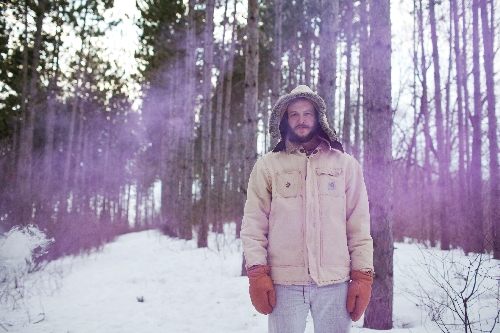Bon Iver playing The Joint

“At what point do you stop promoting your music?” Justin Vernon asks.
It’s a fair question, one that’s been heavy on the mind of the man behind indie folk troupe Bon Iver, whose career has flashed to life with the heat and brightness of a solar flare in recent years.
“The whole point of punk rock promotion is to get people to listen to your music, and then it stops after that,” he continues. “The train got going, and we have been trying to pull on a bunch of levers to make sure that we don’t get too far ahead of ourselves.”
Vernon’s a direct, thoughtful kind of guy, one who’s comfortable fielding questions about his art even if he doesn’t always sound like he enjoys it all that much. Why would he?
His songs are introspective and personal, but he doesn’t hand listeners his feelings on a stick, his delicately spun, carefully arranged repertoire thick with metaphors and symbolism, often of a nature bent, delivered in Vernon’s heavily harmonized, upper-register singing voice, which is the opposite of the deep tones he employs in conversation.
So there’s little inclination for Vernon to part the veil too much on Bon Iver — he’s a candid songwriter, but not a confessional one.
And so as the band has gone from critically lauded underground favorites beginning with their 2008 debut, “For Emma, Forever Ago,” to multiple Grammy winners with last year’s “Bon Iver, Bon Iver” — which debuted at No. 2 on the Billboard album chart, selling more than 100,000 copies its first week out — Vernon is careful to protect the uninhibited, hands-off nature of his music, which was born far outside of the record industry. (Vernon penned Bon Iver’s first songs in isolation in a cabin in his native Wisconsin while he was recovering from mono.)
He’s not oblivious to the demands of being in a band with an ever growing public profile, one that can now play large halls and amphitheaters in some markets and be a featured act on such tentpole festivals as Coachella and Bonnaroo, but he hasn’t exactly embraced them, either.
“I’m not comfortable with it, and there’s a certain part of me that I don’t want to ever adjust to it,” Vernon says of the heightened status and attention that comes with being in a successful act. “I just know that my job is to play guitar and make music that I want to hear and that other people will probably want to hear, too.”
If Vernon sounds like a true believer, it’s because he very much is one.
“A three-minute song and a couple of chords can change someone’s life. It changed my life,” he says. “I got addicted to that and never wanted to be away from it.”
Bon Iver isn’t his first project — he kicked around in various groups in both Wisconsin and North Carolina prior to this — but it did spark something of an artistic epiphany for Vernon.
“I had really decided to stop screwing around and get deep into my brain and try to make music that was going to be challenging longer than three times after writing the song,” he says. “That’s what Bon Iver is to me, the opportunity to free of any of that. It’s going to be all the way there the whole time.”
The hard part now, as a heavily touring musician?
Going there without going through the motions.
“The challenge for me for touring is to not just do it like every job in the world where you just sign up, ‘Oh, where we going today? Cool,’ ” Vernon says. “It’s a big challenge, especially at our level, playing bigger venues to make the show seem sincerely unique.
“I think when anything becomes a business that peoples’ creativity sort of gets down second, third, fourth, fifth on their list of priorities,” he continues. “When you’re booking shows, promoting shows, lighting shows and doing it every day, it’s hard for the concerts to be unique and feel different. That’s my challenge now, to make it not feel like everything else in the world. That’s what we need music for.”
Contact reporter Jason Bracelin at jbracelin@ reviewjournal.com or 702-383-0476.